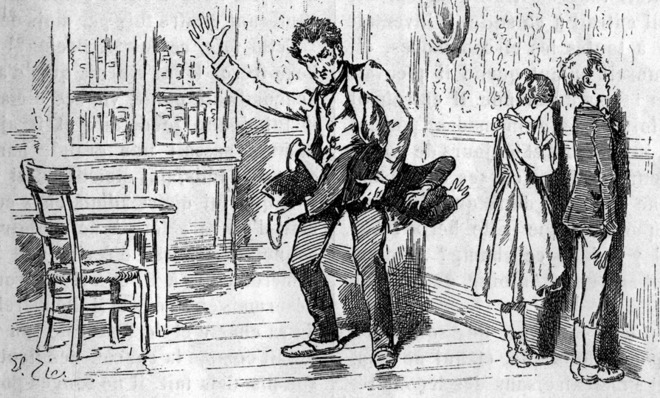Christians have no moral rationale for spanking their children
80 percent of born-again believers say physical punishment of children is acceptable. But neither the Bible nor social science supports spanking.


A free daily email with the biggest news stories of the day – and the best features from TheWeek.com
You are now subscribed
Your newsletter sign-up was successful
As everyone living above ground knows, Minnesota Vikings' star running back Adrian Peterson has been indicted on child abuse charges. The NFL star hit his four-year-old son with a "switch," creating welts on the child's legs, scrotum, and buttocks. In response, the outspoken Christian athlete invoked the Almighty, tweeting a picture from a popular religious devotional, Jesus Calling, with a quote about the perils of "habitual judging."
Peterson isn't the only Christian who thinks good parents should hit their children, or even that their faith commands it. Eighty percent of born-again Christians believe that spanking is acceptable. This is 15 percent higher than the general population.
But the wrong-headed belief that hitting children is not only a good thing but a "God thing" is rooted in poor and partial readings of the Bible, as well as ignorance about modern social science.
The Week
Escape your echo chamber. Get the facts behind the news, plus analysis from multiple perspectives.

Sign up for The Week's Free Newsletters
From our morning news briefing to a weekly Good News Newsletter, get the best of The Week delivered directly to your inbox.
From our morning news briefing to a weekly Good News Newsletter, get the best of The Week delivered directly to your inbox.
This false gospel of spanking preached by many belt-swinging believers is harmful to children. It must stop.
An article on the "Focus on the Family" website written by evangelical author Chip Ingram says, "The Bible's word on discipline clearly demands that parents be responsible and diligent in spanking."
I grew up in the evangelical South in a pro-spanking family. When my fellow Christians talked about protecting parents' "rights to discipline their children," they would often quote Proverbs 13:24: "Whoever spares the rod hates their children, but the one who loves their children is careful to discipline them."
That settles it, right?
A free daily email with the biggest news stories of the day – and the best features from TheWeek.com
Wrong.
The key to interpreting this verse is the word "rod." As Michael Eric Dyson, an ordained Baptist minister and professor of sociology at Georgetown University, noted in The New York Times recently, the Hebrew word translated "rod" refers to a shepherd's rod, which "was used to guide the sheep, not to beat them." The author of this Proverbs 13:24 (and the other "rod" verses) is saying that parents who love their children will guide, lead, and discipline them — not beat them.
Outside of this passage and a few others in the (non-literal) book of Proverbs, the Bible barely says anything about physical punishment of children. You'll find nothing aside from a few general references to "discipline." There are none — count 'em, zero — verses in the New Testament endorsing spanking.
Instead, many New Testament passages discourage hitting a child for any reason. There are numerous commands against physical violence of all kinds and, of course, the famous command to "turn the other cheek" rather than react in anger when provoked. Both Ephesians 6 and Colossians 3 include commands for parents to not provoke their children. Jesus was a defender of children, offered a withering warning about harming them, and taught that violence only creates more violence.
Pro-spanking Christians justify their position by pointing to a Proverbs passage they clearly don't understand, or by ignoring the entire New Testament and Jesus' teachings. But setting aside for a moment the gospels, there is a more practical reason to oppose spanking: It doesn't work.
Many social scientists have explored the effects of spanking on children, and the majority of their results are overwhelming negative. Elizabeth Gershoff, a professor at University of Texas, spent 15 years systematically reviewing hundreds of studies conducted over more than 60 years on corporal punishment.
"There's no study that I've ever done that's found a positive consequence of spanking," Gershoff said. She adds that spanking "doesn't make your kids better behaved. You think it does. ... It doesn't."
Don't tell Ingram about Gershoff's conclusions. He contends that spanking "modifies attitudes and behavior, and actually strengthens the bond between parent and child." But Ingram confuses the cessation of a behavior — most people will stop acting a particular way when you hit them — with a positive improvement.
In reality, as a study based on real-time home audio recordings showed, children who were hit or slapped by their parents usually misbehaved again within 10 minutes. And a 2010 study published in the journal Pediatrics showed that frequent spanking (defined as more than twice per month) was linked to higher levels of child aggression. It's also been linked to "hostile attribution bias," which in layman's terms means the child expects people to be mean to them.
Recent studies have also shown that children who are spanked may develop less grey matter in their brains, which hampers their ability to evaluate rewards and consequences or make critical decisions. This may also predispose them to addiction or depression. Contrary to Ingram's (and James Dobson's and other conservative Christians') assertions, the more you physically punish your children, the less self-control they have.
In addition to the possible long-term psychological and physiological effects of spanking, there is an increased risk of immediate physical harm. After studying almost 2,500 children, Tulane University professor Catherine Taylor noted, "Hitting for discipline raises the risk of child abuse by three times, and by nine times if an object such as a belt is used."
The chance of abuse steepens when parents hit in an emotional moment or are venting their own repressed anger. Of course, parents will often tell you that they usually spank compassionately and rarely. But don't believe them. Many parents aren't fully aware of their disciplining habits. Researchers at Southern Methodist University, for example, found that parents who spank say they do so around 18 times a year, but it was actually closer to 18 times a week.
Scientific data is so devastatingly negative about the effects of spanking it's difficult to conceive why any parent would engage in this practice. And it's not as if religious parents can point to the Bible for justification.
If you're a conservative Christian who is hell-bent on hitting your kids, just accept that science has done all it can to wave red flags. The Bible is not to blame for the damage you've done to the pink-faced child who thinks you hung the moon. Jesus has nothing to do with it. It's your fault.
Jonathan Merritt is author of the book Learning to Speak God from Scratch: Why Sacred Words are Vanishing — and How We Can Revive Them and a contributing writer for The Atlantic.
